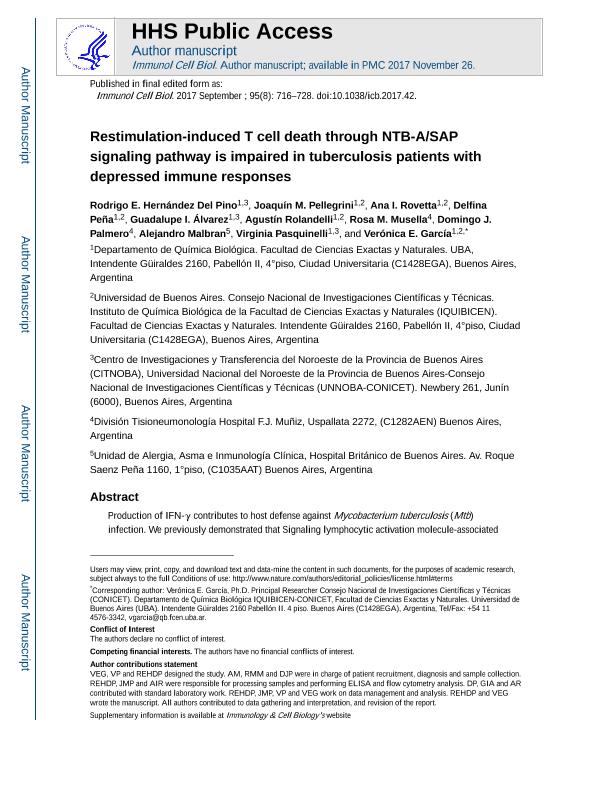Artículo
Restimulation-induced T-cell death through NTB-A/SAP signaling pathway is impaired in tuberculosis patients with depressed immune responses
Hernández del Pino, Rodrigo Emanuel ; Pellegrini, Joaquín Miguel
; Pellegrini, Joaquín Miguel ; Rovetta, Ana Inés
; Rovetta, Ana Inés ; Peña, Delfina
; Peña, Delfina ; Alvarez, Guadalupe Inés
; Alvarez, Guadalupe Inés ; Rolandelli, Agustin
; Rolandelli, Agustin ; Musella, Rosa María; Palmero, Domingo J.; Malbrán, Alejandro
; Musella, Rosa María; Palmero, Domingo J.; Malbrán, Alejandro ; Pasquinelli, Virginia
; Pasquinelli, Virginia ; García, Verónica Edith
; García, Verónica Edith
 ; Pellegrini, Joaquín Miguel
; Pellegrini, Joaquín Miguel ; Rovetta, Ana Inés
; Rovetta, Ana Inés ; Peña, Delfina
; Peña, Delfina ; Alvarez, Guadalupe Inés
; Alvarez, Guadalupe Inés ; Rolandelli, Agustin
; Rolandelli, Agustin ; Musella, Rosa María; Palmero, Domingo J.; Malbrán, Alejandro
; Musella, Rosa María; Palmero, Domingo J.; Malbrán, Alejandro ; Pasquinelli, Virginia
; Pasquinelli, Virginia ; García, Verónica Edith
; García, Verónica Edith
Fecha de publicación:
09/2017
Editorial:
Nature Publishing Group
Revista:
Immunology and Cell Biology
ISSN:
0818-9641
Idioma:
Inglés
Tipo de recurso:
Artículo publicado
Clasificación temática:
Resumen
Production of IFN-γ3 contributes to host defense against Mycobacterium tuberculosis (Mtb) infection. We previously demonstrated that Signaling lymphocytic activation molecule-associated protein (SAP) expression on cells from tuberculosis (TB) patients was inversely correlated with IFN-γ3 production. Here we first investigated the role of NK, T- A nd B-cell antigen (NTB-A)/SAP pathway in the regulation of Th1 response against Mtb. Upon antigen stimulation, NTB-A phosphorylation rapidly increases and afterwards modulates IFN-γ3 and IL-17 secretion. To sustain a healthy immune system, controlled expansion and contraction of lymphocytes, both during and after an adaptive immune response, is essential. Besides, restimulation-induced cell death (RICD) results in an essential homeostatic mechanism for precluding excess T-cell accumulation and associated immunopathology during the course of certain infections. Accordingly, we found that the NTB-A/SAP pathway was required for RICD during active tuberculosis. In low responder (LR) TB patients, impaired RICD was associated with diminished FASL levels, IL-2 production and CD25high expression after cell-restimulation. Interestingly, we next observed that SAP mediated the recruitment of the Src-related kinase FYNT, only in T cells from LR TB patients that were resistant to RICD. Together, we showed that the NTB-A/SAP pathway regulates T-cell activation and RICD during human TB. Moreover, the NTB-A/SAP/FYNT axis promotes polarization to an unfavorable Th2-phenotype.
Palabras clave:
Tuberculosis
,
Linfocitos
,
Host Defense
,
Patients
Archivos asociados
Licencia
Identificadores
Colecciones
Articulos(SEDE CENTRAL)
Articulos de SEDE CENTRAL
Articulos de SEDE CENTRAL
Citación
Hernández del Pino, Rodrigo Emanuel; Pellegrini, Joaquín Miguel; Rovetta, Ana Inés; Peña, Delfina; Alvarez, Guadalupe Inés; et al.; Restimulation-induced T-cell death through NTB-A/SAP signaling pathway is impaired in tuberculosis patients with depressed immune responses; Nature Publishing Group; Immunology and Cell Biology; 95; 8; 9-2017; 716-728
Compartir
Altmétricas



